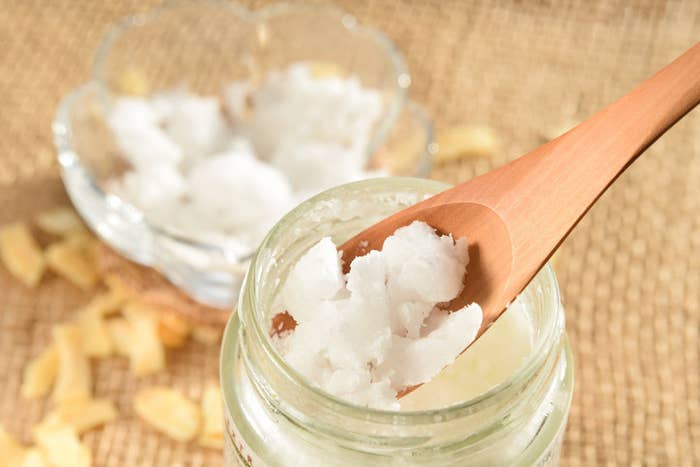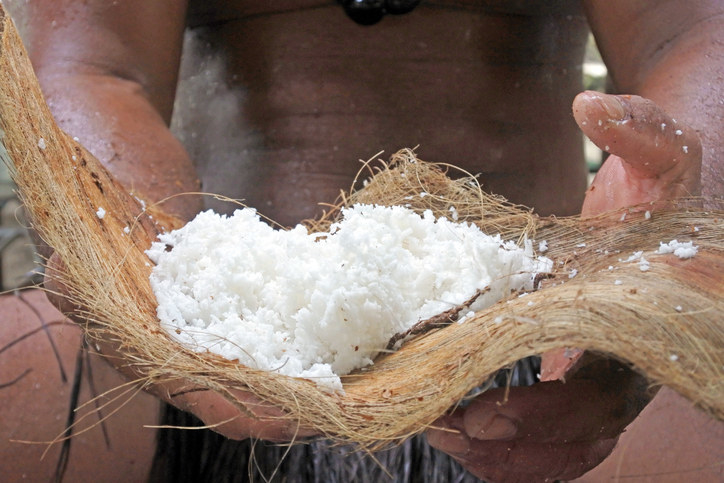In an online lecture that has gone viral, professor Karin Michaels, an epidemiology researcher from Harvard's T.H. Chan School of Public Health, has referred to coconut oil as "one of the worst things you can eat".
Michaels also said that the substance was about as good for wellness as "pure poison".
The lecture, titled "Coconut oil and other nutritional errors" was conducted at the University of Freiburg.
Michaels based her statements on the high level of saturated fat in coconut oil, which raises cholesterol levels in the blood and increases risk of cardiovascular disease.
The statements from Michaels' lecture may have come as a shock to many who believe in the health benefits of coconut oil, which has become a fashionable addition to Western diets in recent years.
There are countless coconut oil recipes recommending its addition to baked goods, smoothies, stir fries, broth, and coffee.
Numerous lists on the internet espouse coconut oil's purported health benefits, such as helping to reduce hunger, reducing cholesterol and increasing fat burning.
Although its popularity has waned in recent years since a consumption peak in 2012 in Australia, the perception that coconut oil is a healthy addition to diets appears to have persisted.
Okay, so what do the studies say about coconut oil?
The oil has a high content of saturated fatty acids (92%) and has been classified by dietary bodies alongside butter, palm oil, and animal fats as a source of saturated fat to be consumed only at low levels in the diet.

The American Heart Association (AHA) published a report on dietary fats last year that found despite 72% of Americans rating coconut oil as a "healthy food", there are not enough beneficial effects to outweigh the negative effects of its use.
The AHA report concluded: "We advise against the use of coconut oil".
Nutritionist Catherine Saxelby told BuzzFeed News that coconut does not have any recognisable benefits compared to other sources of fats.
"It doesn't have any vitamins or minerals or any helpful phytochemicals...extra virgin olive oil does and sunflower oil is very high in vitamin E, but coconut [oil] doesn't have any obvious health benefits that I can see."
While some pop health articles on the internet have told readers that coconut oil does not significantly increase low-density lipoprotein (LDL) cholesterol, this contradicts the literature.
LDL is widely recognised as the "bad" cholesterol that builds up in the walls of arteries and increases risk of cardiovascular disease and heart attack.
The AHA report found seven controlled trials that tested cholesterol levels and six of those trials saw a significant increase in LDL cholesterol after consuming coconut oil.
The trials showed that coconut oil raised LDL levels significantly compared with olive oil – but not as much as butter.
New Zealand's Heart Foundation came to the same conclusion in 2014 saying that "nothing in the literature disputes the fact it acts as a saturated fat and raises total cholesterol, LDL cholesterol and HDL cholesterol".
Why do we keep hearing that it helps people lose weight then?
The claim that coconut oil helps you lose weight appears to be a result of conflating coconut oil study results with study results from a product that is derived from it: medium-chain triglycerides (MCTs).
MCT oil is a semi-synthetic product that was introduced in the 1960s to aid feeding malnourished people due to its solubility in water and rapid absorption in the body.
It is made by isolating MCTs from either coconut oil or palm oil and has shown some success in weight loss in humans (although due to the high dose required it is not recognised as a feasible treatment).
While coconut oil and MCT oil do share certain acids, they are not alike enough in composition to extrapolate results from MCT trials.
New Zealand's Heart Foundation concluded in their report that coconut oil "therefore needs to be judged on its own merits in rigorous human studies".
One 2011 trial using virgin coconut oil did record a statistically significant reduction in waistline for men who were consuming 30ml of the oil a day, but it was an uncontrolled study that did not record any additional dietary changes over the study period.

Okay, now let's talk about coconut oil and indigenous populations.
The concept that coconut oil is healthy for diets has its origin in studies of Indigenous populations that show low rates of cardiovascular disease and point to high consumption of coconuts.
These studies began in the 1960s and looked to Polynesian and Melanesian populations as examples of this phenomenon.
However this epidemiological research shouldn't be used as evidence for coconut oil's benefits because, firstly, coconut oil is a relatively recent byproduct and these populations subsist off the flesh of coconuts and the squeezed coconut cream.
Secondly, these populations also did not traditionally eat processed foods and consumed a diet high in fruit and vegetables, with the main protein source being fish.

One 2016 literature review on coconut oil from Nutrition Reviews journal states that the "original participants of the Kitava [island in Papua New Guinea] study had an active lifestyle without major influences from a Western diet.
"This is in contrast to the consumption of coconut oil in a typical Western diet, which contains more processed foods, less fish, less fruit and vegetables, and more saturated fat than recommended in dietary guidelines."
The New Zealand Heart Foundation also points out that, contrary to the studies conducted on Polynesian and Melanesian populations, studies of the Sri Lankan population (which also has coconut as a primary source of dietary fat) show a relatively high incidence of coronary heart disease.
The foundation states that these Indigenous population studies are "observational studies" that "cannot show causation and are prone to confounding".
Saxelby believes these studies have been misleading: "I don't think there are any health benefits, I think coconut fat has been completely misrepresented; it's not the whole food, it's not the same as eating a whole coconut – which you can do."
